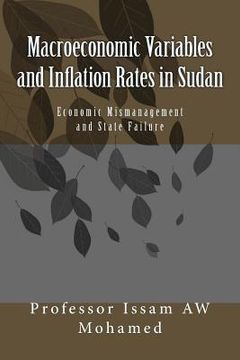Share
Macroeconomic Variables and Inflation Rates in Sudan: Economic Mismanagement and State Failure
Issam Aw Mohamed
(Author)
·
Createspace Independent Publishing Platform
· Paperback
Macroeconomic Variables and Inflation Rates in Sudan: Economic Mismanagement and State Failure - Mohamed, Issam Aw
Choose the list to add your product or create one New List
✓ Product added successfully to the Wishlist.
Go to My Wishlists
Origin: U.S.A.
(Import costs included in the price)
It will be shipped from our warehouse between
Friday, August 09 and
Friday, August 16.
You will receive it anywhere in United Kingdom between 1 and 3 business days after shipment.
Synopsis "Macroeconomic Variables and Inflation Rates in Sudan: Economic Mismanagement and State Failure"
The current book analyzes the effects macroeconomic variables on inflation in of Sudan. The selected data set was from 1990-2008. During that time, there were significant changes in macroeconomic policies that had strong impacts on the performance of the Sudanese economy. A strong wave of hyperinflation was recorded during the beginning years of the 1990s. That was followed by relative stabilization and less inflation rates. Similar changes in the monetary policies were observed. Part of the 1990, implemented package of policies to solve the shortage of foreign exchange problem provoked increasing the supply of domestic currency. Free market economy was adopted through liberalizing trade and boosted exerting efforts to promote exports, besides adopting encouraging policies for the benefit of increasing productivity. The results reveal that there are negative effects of some macroeconomic variables on inflation, specifically GDP. Thus, GDP had the greatest effect on inflation. Money supply also positively affected inflation, which reveals possible increases, governmental deficit financing, and printing banknotes. The coefficient of determination (R2=94.0) verifies the model results. There was also a positive but weak and insignificant correlation between deficit financing and foreign currencies exchange rates. That corroborates conclusions that whenever exchange rate is determined by the market forces with weak economic productive base the impacts fall on income. It is possible that implementing floating exchange rates weakened the economic productive sectors of the country.
- 0% (0)
- 0% (0)
- 0% (0)
- 0% (0)
- 0% (0)
All books in our catalog are Original.
The book is written in English.
The binding of this edition is Paperback.
✓ Producto agregado correctamente al carro, Ir a Pagar.

